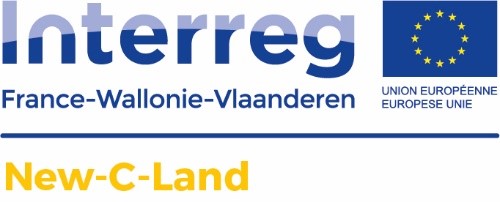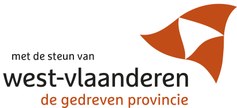Interreg France-Wallonie-Vlaanderen - New-C-Land

Introduction
New-C-Land (Added value of cross-border valorisation of marginal land in support of a bio-based economy) aims at i) identifying marginal land in the regions concerned with the best possibilities for biomass valorisation (non-food), ii) bringing landowners and biomass customers into contact in order to encourage the development of industrial value chains, and iii) eliminating practical and organizational bottlenecks in order to initiate biomass projects. The project, funded by the Interreg France-Wallonie-Vlaanderen Programme, is coordinated by Prof. Erik Meers (UGhent, Belgium) and started in 2018, with a total duration of 4 years. Nine research groups, companies and institutes from the three regions are involved in this European project
Project
Space in the border regions of Flanders, Wallonia and France is scarce. However, many parcels remain unused at the moment, for example due to environmental pollution. The respective (regional) governments are currently strongly committed to the identification and redevelopment of these often abandoned, underutilized and neglected sites. The underlying idea is to revalue such brownfields, rather than opening up new areas. The project regions should also achieve international goals (COP21, Climate and Energy 2030), with reduced dependence on fossil sources, lower greenhouse gas emissions and implementation of sustainable economic activities.
In the transition to a more circular economy, it is crucial to ensure economic (re)development as well. The intended production and valorisation of biomass can stimulate a transition to innovative, bio-based business management in the area of raw material valorisation as well as bio-energy.
New-C-Land will have a direct impact on companies in the border region by tackling crucial issues from the bottom up, which companies cannot solve on their own. In the long term, the project will stimulate the trans-regional bio-based economy through the sustainable use of local resources produced on marginal land.
Objectives
These are the objectives of New-C-Land:
• To avoid conflicts between uses of arable land
• To diversify sources of plant-based materials
• To improve the knowledge of scientific researchers who are managing land by introducing plant crops
• To transfer innovative best practices
• To improve cross-border transfer of knowledge
• To capitalise on abandoned areas
• To break down technical, economic, regulatory and sociological barriers
Role of Ghent University
The Faculty of Applied Bioscience Engineering of Ghent University is specialized in applied research and development with and for market actors. The ECOCHEM research group, within this faculty, focuses on renewable resources from bioprocesses, with particular focus on nutrient recycling.
As lead partner, Ghent University will ensure a good project delivery by a concise follow-up of the proposed activities across the different partners. Moreover, the research expertise of ECOCHEM will be directly applied for the creation of value-chains from the biomass cultivated in marginal lands, and the communication network previously established through the Biorefine Cluster Europe, coordinated by Ghent University, will be used for reaching stakeholders and disseminating the project’s results.
Dutch summary
Het New-C-Land project wil valorisatieprojecten van plantaardige biomassa afkomstig van marginale gronden ondersteunen en concretiseren.
Met de groei van de bio-economie stijgt ook de vraag naar plantaardige grondstoffen. Het is dus van wezenlijk belang om die gebieden in kaart te brengen waarop gewassen geplant kunnen worden om te voorzien in deze toekomstige behoeften en om de sectoren betrokken in de valorisatie van biomassa in de grensregio te ondersteunen.
Website
Contact
Prof. Erik Meers
Department of Green Chemistry and Technology
E-mail

